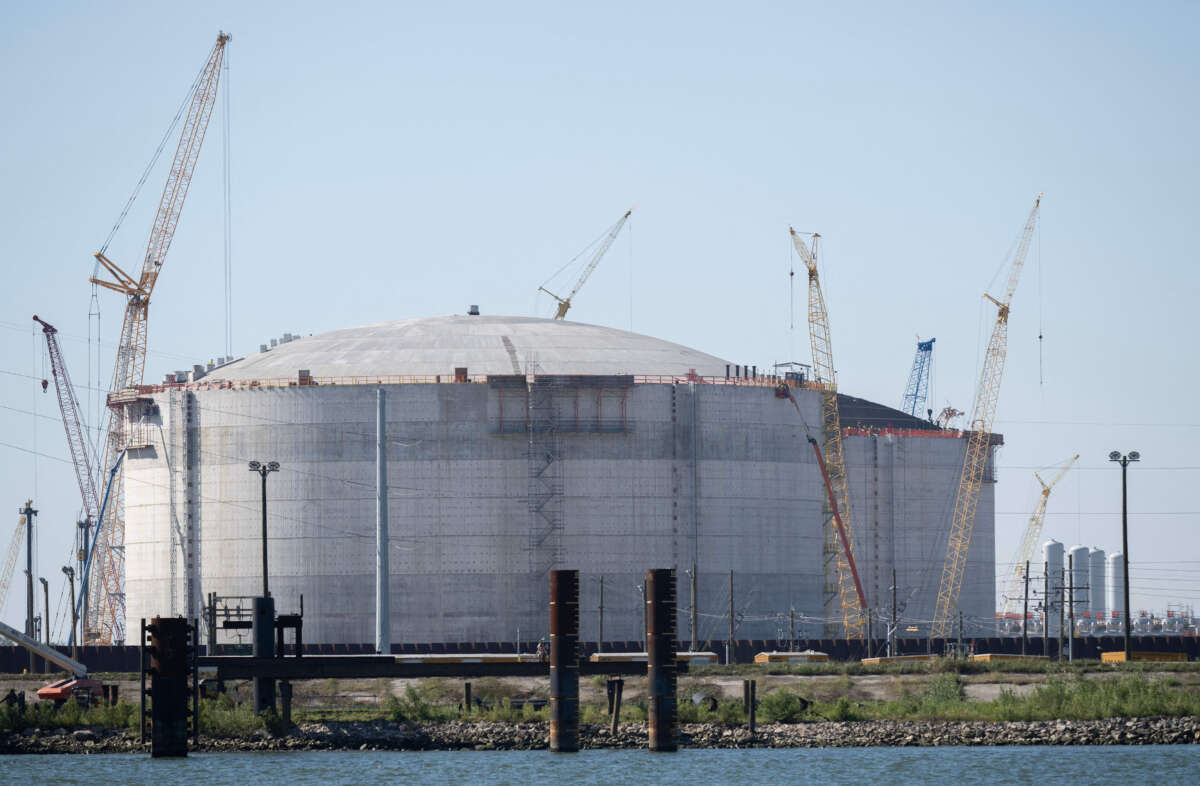Support justice-driven, accurate and transparent news — make a quick donation to Truthout today!
With residents of frontline communities in Texas and Louisiana protesting outside, the Federal Energy Regulatory Commission (FERC) approved on Thursday a crucial permit for a massive fossil gas export terminal in Southwest Louisiana that has become of one the nation’s biggest climate and environmental justice controversies.
FERC authorized construction of CP2, a liquified natural gas (LNG) export terminal in Southwest Louisiana’s Cameron Parish, where an existing LNG facility has already disrupted fisheries and exposed local communities to harmful pollution. However, the project still needs a permit from the Department of Energy, and President Joe Biden has “paused” such approvals while regulators update the process for determining whether fracked gas exports are in the public interest.
“This action highlights the importance of Biden’s courage in pausing these permits,” climate activist Bill McKibben told reporters on Thursday. “If he hadn’t, the federal government would be about to rubber-stamp a travesty of environmental injustice that will help heat the planet, all in the midst of the hottest year in human history.”
If approved by federal regulators, CP2 would process nearly 4 billion cubic feet of fracked methane gas for export to 20 countries on a daily basis, locking in climate-warming emissions across the globe for decades to come. Moreover, LNG exports at eight existing terminals are linked higher energy prices for U.S. households and businesses, which must contend with the volatile international market rather than prices set by domestic consumption.
Roishetta Ozane, founder of Vessel Project of Louisiana, an environmental justice group, said she is disappointed with FERC’s decision but not surprised. Ozane gathered with about 200 other Gulf South activists on Thursday to protest outside of FERC’s headquarters in Washington, D.C.
“This approval is a direct threat to the communities living near the proposed facility, and it is disheartening to see our well-being and concerns being disregarded,” Ozane said over email on Thursday. “We have seen our energy costs rise, our insurance premiums rise, and we’ve been victim to more devastating disasters. We want the polluters out.”
A handful of Democrats in Congress are also opposed to the project, with Sen. Jeff Merkley of Oregon urging FERC to reject CP2 in a letter this week.
“CP2 fails to meet the standard of public convenience and necessity — these supercharged fossil fuel exports will do nothing but bring unnecessary harm, grief, and high prices,” Merkley said in a statement.
FERC’s environmental impact analysis for CP2 does not characterize the potential climate impacts as “significant or insignificant,” leaving that determination up to federal regulators in the Biden administration. FERC is an independent agency and does not take orders from the White House.
Taking a stand in her last meeting with FERC, outgoing Commissioner Allison Clements issued a dissent against the decision to approve CP2 and a related pipeline that will feed the facility, both proposed by the fossil fuel firm Venture Global. Clements said FERC’s environmental analysis does not “adequately address” the impacts that CP2 would have on southern Louisiana communities already surrounded by petrochemical polluters.
“These will have enormous emissions of greenhouse gases, equivalent of putting 1.8 million new gas-powered cars on the road each year; the order does not meaningfully access those emissions,” Clements said, adding that FERC is relying on data provided by Venture Global that is not accessible to the public.
Clements was referring to pollution released by directly by the proposed export terminal, but environmentalists take a broader view of the potential climate damage. Methane is a potent greenhouse gas and leaks into the atmosphere during the entire fossil gas lifecycle, from initial production in the vast fracking fields of Texas to its final destination overseas, where the liquefied fuel is re-gasified and burned.
From that perspective, the gas flowing through CP2 is estimated to have greenhouse gas emissions equivalent to 42 million gas-powered cars or 46 coal-fired power plants, according to the Sierra Club.
U.S. gas exports are sometimes touted as an important “bridge fuel” for China, a major consumer of coal and contributor to global warming, but a new report from the Institute for Energy Economics and Financial Analysis throws cold water on the industry’s claims.
“Policymakers in both LNG exporting and importing countries should approach claims about the necessity of LNG as a ‘bridge fuel’ with a high degree of skepticism,” said Sam Reynolds, an LNG researcher and coauthor of the report, in a statement this week. “The case of China clearly shows that LNG has played a minimal role in displacing coal in the country’s largest coal-consuming sectors.”
However, one of the strongest cases against CP2 may come from the people already living in the shadow of Venture Global’s existing export terminal in Cameron Parish. After just a few years in operation, by 2023 the facility had racked up 138 violations for releasing more pollution into the air than allowed.
Travis Dardar, an Indigenous fisher in Cameron Parish, has been organizing fellow fishers against CP2 for months now. Massive tanker ships carrying LNG for export already clog crucial fishing grounds, and if CP2 is built, that traditional way of life will be over.
“We refuse to sink. We are going to fight them here,” Dardar said after FERC approved CP2. “We are going to fight them at home. This is far from over.”
Media that fights fascism
Truthout is funded almost entirely by readers — that’s why we can speak truth to power and cut against the mainstream narrative. But independent journalists at Truthout face mounting political repression under Trump.
We rely on your support to survive McCarthyist censorship. Please make a tax-deductible one-time or monthly donation.
